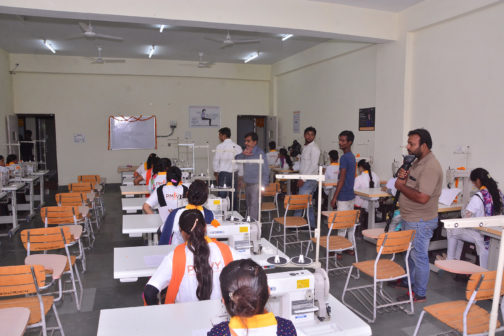“Skilling the supervisors and mid-management personnel is as important as skilling the workers at the base level to survive and scale in the global leather market.” Delivering this strong message for re-looking at our skill development priorities and programs, in this Skill Talk, M. Rafeeque Ahmed, Chairman, Farida Group, tells us how capacity building, planning and professionalism are the key to deliver and compete with high-volume players like China and Vietnam. A Padmashri awardee and a distinguished leader of Indian leather industry, Shri M. Rafeeque Ahmed shares his valuable advice in this exclusive interview for LSSC newsletter. Let’s read on…
Capacity building as a competitive strategy: why growth and size of the enterprise matters
 Your capacity is critical in exploiting a business opportunity. You need to have a strategy to enhance production without duplicating the costs. Instead of operating as many small enterprises, if you have a large factory, the overheads go down significantly and production capacity goes up; this is one step towards facing the international competition. Unlike China that has large factories, India has many small and medium companies that make 5000 to 6000 pairs of shoes. What is considered a large enterprise in India is actually small or medium in China!
Your capacity is critical in exploiting a business opportunity. You need to have a strategy to enhance production without duplicating the costs. Instead of operating as many small enterprises, if you have a large factory, the overheads go down significantly and production capacity goes up; this is one step towards facing the international competition. Unlike China that has large factories, India has many small and medium companies that make 5000 to 6000 pairs of shoes. What is considered a large enterprise in India is actually small or medium in China!
We need to think and act big! 64% of India’s export business caters to European market by fulfilling relatively small orders, now we need to understand and explore American market for bigger orders. Unless we build capacity with large factories, we won’t be able to compete with China or Vietnam. Compared to Vietnam’s footwear business of 17 billion USD, Indian exports stand at 2.4 billion USD.
 Skill development has to include all levels of employees
Skill development has to include all levels of employees
Irrespective of the size of the enterprise, skill development is absolutely essential to productivity and timely delivery. And, we need to improve skills as per changes in technology and production processes. Again, reskilling or upskilling alone doesn’t help; the entire management system has to improve through effective planning and process efficiency.
Need of the hour is to skill supervisors and floor managers. They are the people who drive production and influence business results. Today, leather industry is facing a problem because the entire focus is on skilling the workers at the cost of supervisory staff. China has sustained its competitive edge by skilling their supervisors. The job of the floor manager is not to shout at people or just give instructions. They should know how to handle emergencies, unforeseen situation and absence of people without affecting the production line. Unless you have good supervisors, even the most skilled workers cannot deliver. Right supervision and guidance makes right use of the worker by understanding their experience, skills and knowledge. Performance and productivity improve when the workers feel their skills are rightly aligned to their job roles. Otherwise, the workers are blamed for everything and they get frustrated.
In addition to skilling, we need to have professional counselors who can analyse performance and give feedback for improvement. Roles are limited at the top of the pyramid; in our organization, we have 22000 workers and 400 supervisory staff. It’s a challenge to keep the employees motivated and give them higher responsibilities.
Apprenticeships in the leather industry
 Apprenticeship is a popular concept in many manufacturing enterprises across the world. In India, it needs a push because it has many advantages for the leather industry. Let me give you an example from one of our recent units in Kolkata. We engaged apprentices for this factory much before we set it up. We started training them proactively to build the right skills using the real work environment. When the factory was opened, we put them on the job; it is like going on a solo flight after completing your training when you do not have your trainer pilot is not behind you!
Apprenticeship is a popular concept in many manufacturing enterprises across the world. In India, it needs a push because it has many advantages for the leather industry. Let me give you an example from one of our recent units in Kolkata. We engaged apprentices for this factory much before we set it up. We started training them proactively to build the right skills using the real work environment. When the factory was opened, we put them on the job; it is like going on a solo flight after completing your training when you do not have your trainer pilot is not behind you!
Apprenticeship gave them a feeling of the real factory and helps them speed up and work under pressure. This is very different from learning in a school. In the leather industry we need apprentices in every department. For instance, Production Engineering is a sophisticated skill, we need people from Industrial Engineering background. We should stop talking only about the workers when it comes to skills the factory have 6 to 7 departments, each one of them needs separate skills, different levels
My mantra is to think about what can go wrong for delivery and create alternative plans to meet exigencies. Ultimately, one who performs better in spite of unforeseen events has an advantage and becomes successful.
Advice for young entrepreneurs
I started in 1964, taking up from my father who was into commodity segment. We were exporting tanned leather to UK and it was a totally different business environment in those days. Today, we have fierce competition and surviving and growing is totally dependent on your planning, production and delivery mechanism. When it comes to funding, Government schemes only help by giving 5% to 10% incentive, rest of it has to be the entrepreneur’s investment.
And performing consistently in a global market needs a drastic shift from the typical Indian mindset that doesn’t respect timelines and delivery dates.
As an entrepreneur, it is not your own performance that matters, all your team members should work synchronously to achieve the goals only then you can build your company’s brand and reputation. If your planning is poor you cannot sustain and meet international standards. Today, quality is a given, you need to compete on value added services, how you can make the customer feel comfortable and meet planning and unplanned requirements. Your entire supply chain and vendors have to be trained in high professional standards.
(Re-published from LSSC Newsletter with permission from Leather Sector Skill Council – LSSC)












